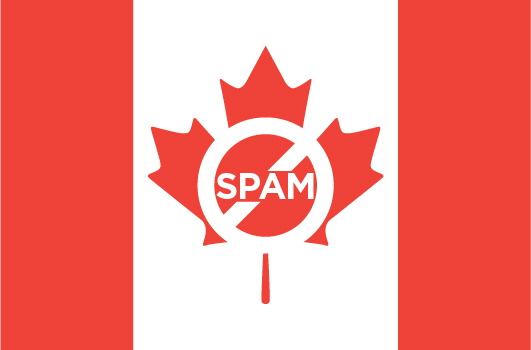Canada just passed a new law regarding digital communications including email, program downloads, and other electronic communications and come with some stiff penalties for non-compliance. Why are we writing about an anti-SPAM law that Canada passed? The reason is because the law applies to any businesses, organisations, and even individuals regardless of your country of origin. The law just went into effect July 1, 2014. You can read all about the Canada Anti-Spam Legislation on their official website; it is abbreviated as CASL for short and is pronounced like ‘castle’. Here are some of the main things you need to know about CASL and how it applies to your business.
Source: responsys.com
CASL Doesn’t Only Apply to Email Communications
The rules imposed by CASL apply to email and SMS text messages that are sent for commercial purposes, as well as other electronic threats including installing computer programs, altering the transmission of data without express consent. So that means the law also covers communications that include downloads for browser extensions, shopping downloads, and any programs, especially in the case of malware and computer viruses. As long as your company regularly abides by best practices, there is no need to worry about penalties for sending viruses or malware since you, of course, would not be doing that. However if you do employ the use of downloads including browser extensions and shopping downloads.
CASL Law is Opt-In vs. Opt-Out and Implied Consent vs. Express Consent
Canada’s new Anti-SPAM Law is big news because it is different and stricter than any other regulations currently in place all over the world. This is because CASL makes OPT-IN necessary and the current laws are concerned with OPT-OUT compliance. Therefore, in order to be in compliance with the CASL law, you must have express consent to send commercial emails and other electronic messages to consumers after July 1, 2014. We will get to the definition and details of “express consent” in a minute. This applies to your subscriber list, even if you have emailed them before. This is because of the new law’s opt-in vs. opt-out policy. Your business will need to provide proof that you have express consent from a person in order to communicate with them digitally.
Under CASL, here are the 3 requirements listed to have permission to send email and electronic messages:
1. Express consent
2. Identification and information
3. An unsubscribe mechanism
Your request for consent must include the following 4 pieces of information as outlined by MailChimp.com:
- A clear and concise description of your purpose in obtaining consent
- A description of messages you’ll be sending
- Requestor’s name and contact information (physical mailing address and telephone number, email address, or website URL)
- A statement that the recipient may unsubscribe at any time.
This means that these types of implied consent sign ups no longer constitute approval to send communications:
- An auto checked newsletter sign up box in a form or shopping cart check out. (Must be unchecked to show express consent.)
- Adding an email address to your list after purchase or other engagement.
- Inaction also no longer constitutes the ability to add a contact to your commercial list or newsletter. In other words, when you send an email telling the recipients that they have been added to your email subscriber list, they must reply that they do consent to receive emails in order for you to continue sending digital communications. Their inaction will mean that you have to remove them from your list.
Rules for Businesses Communicating with Current and Recent Customers
There are provisions in CASL for businesses who have been communicating to previous customers through implied consent. So, if you have done business within the previous 2 years, you may continue to send digital communications labelled as implied consent up until 24 months after a purchase or 6 months after sending an inquiry to your company. Here are the types of business interactions that fall under this implied consent temporary approval:
- Purchasing a product or a service.
- Entering into a business deal.
- Party to a contract.
- Membership with your organisation.
To continue sending emails to these groups, you must get expressed consent before the 24 month period expires. Other exceptions to the rule cover registered charities and political organisations that a recipient has given a donation, gift, volunteered, or attended a meeting. Implied consent emails are also still allowed to be sent to a recipient in a professional or official capacity if they have not unsubscribed or specifically said they did not want to receive unsolicited emails or electronic communications.
Penalties for CASL Non-Compliance
Penalties for violating the rules under Canada’s Anti-Spam Laws are quite severe. Sending digital communications without the express consent outlined in the legislation can mean you will have topay an administrative monetary penalty (AMP). The maximum allowed penalty for business is $10 million and even individuals can be sued for up to $1 million. The amount of the AMP fine imposed to convicted businesses or individuals will be determined by a list of factors set out by the CASL. The penalties can apply to directions, officers, agents, and mandataries of a corporation if they authorized, assented to, acquiesced in, or participated in the commission of the violation. According to the CASL website, the majority of these laws begin enforcement on July 1, 2014. The sections of the law that deal with sending commercial electronic messages and installation of computer programs begins January 15, 2015; and the sections that relate to the private right of action of recipients comes into enforcement on July 1, 2017. This means that companies should start to clean up their lists in order to be compliant in time. Moving forward for new email sign ups, the subscription method must be changed to an unchecked box and anyone who did not provide express consent must be removed before sending more email communications.
If you require further information or have any specific questions, don’t hesitate to give a member of the GoPromotional team a call on 0800 0148 970 or simply email us today.







